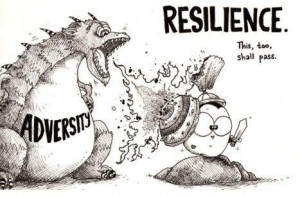Many health professionals no longer speak or counsel about prevention when it comes to buttressing oneself against disease or unhealthy situations or factors. A flu shot does not prevent getting the flu. In some ways, the idea of ill-health prevention sets us up with false expectation. On a daily basis, we all encounter different risks to our health, such is life. Instead, a more meaningful and realistic concept might be risk management; that is, managing healthy behaviour is likely more about how well we adapt to the stressors in our lives. Resilience is generally considered as positive adaptation following a stressful situation. All of the literature on psychological resilience points to the importance of realizing that resilience is a dynamic process. There might be trait resilience – one individual might have a greater capacity for ‘bouncing back’ following a stressful event. And, research also shows that resilience is very much tied to the notion of management – how individuals learn to navigate themselves is a key component of resilient capacity. Recent evidence highlights the signficance of positive emotions in resilient adaptation. A 2006 study by Ong and associate researchers found that resilient individuals use coping strategies that elicit positive emotions. Some of these strategies include benefit-finding or cognitive reappraisal, humor, optimism, and goal-directed problem-focused coping. The following cartoon reflects this strategic adaptative mechanism in the face of the dragon of adversity:
The idea is that people with resilient abilities are able to access these positive emotional resources and thereby exhibit and experience greater resiliency, coping ability, and resistance to stressors. We would suggest that Motivational Inteviewing can play a huge role in building resilience as a coping mechanism. We know that communication, support, trust, encouragement, acknowledgement, a strong self concept, and a positive self image, among a host of other factors are key aspects of building resilient skills and they are all aspects of engagement inherent in MI work. By utilizing MI in their work, logic and evidence point to the importance of health professionals in working with their clients to develop, hone, and expand their resiliency. Whether resilience is caught (a trait) or taught (learned) or both, MI is a potent way of being with clients in fostering their resilience.


